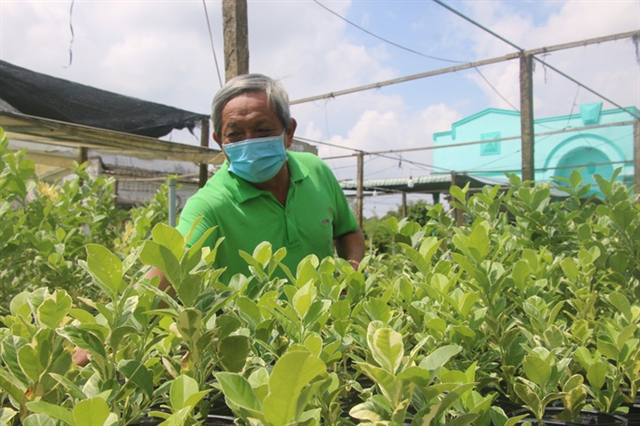 Economy
Economy

Many flower and bonsai farmers in HCM City and the Cửu Long (Mekong) Delta have reduced production for Tết (Lunar New year) early next year since they are worried the COVID-19 pandemic will affect demand.

|
| Many flower and bonsai farmers in HCM City and the Cửu Long (Mekong) Delta are worried the COVID-19 pandemic will affect demand during Tết, so they have cut their output. — Photo nld.com,vn |
HCM CITY — Many flower and bonsai farmers in HCM City and the Cửu Long (Mekong) Delta have reduced production for Tết (Lunar New Year) which falls early next year since they are worried the COVID-19 pandemic will affect demand.
Trần Thị Năm, owner of a flower farm in HCM City’s District 12, said she has reduced cultivation from the usual 10,000sq.m to 4,000sq.m, and only plans to supply to the market 3,000-4.000 pots of cockscomb, marigold and sunflower for Tết.
"Farmers are worried that demand will fall due to the pandemic, and grow a little to sell to old customers.”
Many farmers growing high-value ornamental plants such as orchids and apricots in the city have also cut their output.
Nguyễn Thị Bé, owner of Minh Dũng orchid garden in Củ Chi District, said the prolonged pandemic would cause demand during Tết for flowers to decrease sharply, and so farmers have cut output by 50 per cent.
At this time in previous years farmers in Districts 12, Củ Chi and Hóc Môn and Thủ Đức City were busy planting flowers, but not now.
Phạm Lâm Chính Văn, director of the city Agricultural Extension Centre, said flower demand during Tết is expected to be down.
Focus on quality
Bonsai and flower farmers in flower villages in the Mekong Delta have also cut output and instead focused on quality to avoid oversupply.
Trần Thanh Toản in Đồng Tháp Province’s Sa Đéc city said he planted 5,000 flower pots this year and, like other local farmers, is paying more attention to quality.
"Farmers no longer focus on quantity … but on efficiency and keeping abreast of market information to … meet market demand,” he told Người Lao Động (Labourers) newspaper.
Not far away is the farm of Nguyễn Hoàng Võ Mộng Kha with 7,000 pots of pico, apricot and gerbera daisies, black raspberries, woody grapes, marbled lemons, jery, and other flowers.
Kha said he would be careful in each stage to ensure good quality and that the flowers blossom during Tết.
“I also use social applications such as Zalo and Facebook to [sell to] to traders near and far."
According to the Sa Đéc City economic department, farmers have planted 52 hectares of flowers and ornamental plants for the 2022 Lunar New Year, mainly popular varieties like chrysanthemum morifolium, Taiwanese chrysanthemum, gerbera daisy, and rose.
Bùi Thanh Liêm, head of the Department of Agriculture and Rural Development of Chợ Lách District in Bến Tre Province also said many farmers have significantly reduced their flowers and bonsai cultivation areas this year.
Chợ Lách is the second biggest bonsai and flower growing area in the delta after Sa Đéc.
Liêm said: "In the case of trees such as yellow apricot and kumquat, if farmers cannot sell them this year, they will sell it next year. They have cut output of flowers like marigold and chrysanthemum."
Dương Văn Huyền, director of the Cái Mơn Seedlings and Ornamental Flower Cooperative in Chợ Lách District, said members have reduced output by 40-50 per cent, except of yellow apricot.
Usually customers place orders in advance, but this year no one has made deposits, and so farmers do not dare grow in large numbers, he said.
Normally, bonsai and flower farmers in the Mekong Delta bring their produce to many provinces and cities for sale, but they do not know if they can do so this year because of the unpredictable pandemic situation, he added.
To help farmers sell their produce, localities in the Mekong Delta have co-ordinated with relevant agencies and other localities to help traders and businesses buy and transport bonsai and flowers while also ensuring they meet the Ministry of Health’s 5K conditions.
They have also encouraged farmers to sell on e-commerce channels to limit direct contact. — VNS




